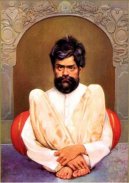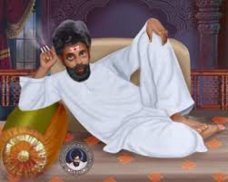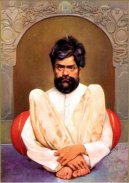






Sadguru Shankar Maharaj

Description de Sadguru Shankar Maharaj
Yogiraj Shri Shankar Maharaj was undoubtedly one of the greatest saints of Maharashtra in the modern age. He was an Auliya or Avadhut, a term used for yogis who have reached perfection and have achieved Siddhis (occult powers). He belonged to the Nath Panth (Sect), though he did not follow its their dress or mannerisms. He took samadhi in Pune at the age of about 150 years on April 28th 1947, an event which he had postponed for seventeen years at the request of his disciple Dr Nagesh Dhaneshwar. His Samadhi Mandir which houses his physical body is in Pune on the Pune-Satara road about 10 Km from Pune Railway station. Hundreds of devotees visit the Mandir every day to pay their respects and receive blessings. It is strongly believed and experienced by his devotees that even though Maharaj is no longer in his physical body, he still looks after the welfare of his devotees. There are many instances reported by his devotees and disciples of his having appeared before them either in his own form or through the bodies of others in the time of crisis.
Yogiraj Shri Shankar Maharaj était sans aucun doute l'un des plus grands saints de Maharashtra dans l'ère moderne. Il était un Auliya ou Avadhut, un terme utilisé pour les yogis qui ont atteint la perfection et ont atteint Siddhis (Les pouvoirs occultes). Il appartenait à la Nath Panth (Sect), mais il n'a pas suivi sa robe ou leur maniérisme. Il a pris samadhi à Pune à l'âge de 150 ans sur Avril 28e 1947, un événement dont il avait reporté pendant dix-sept ans à la demande de son disciple Dr Nagesh Dhaneshwar. Son Samadhi Mandir qui abrite son corps physique est à Pune sur la route Pune-Satara environ 10 km de la gare de Pune. Des centaines de fidèles visitent le Mandir tous les jours pour payer leurs respects et recevoir des bénédictions. Il est fermement convaincu et vécue par ses dévots que même si Maharaj est plus dans son corps physique, il semble encore après le bien-être de ses dévots. Il y a beaucoup de cas rapportés par ses fidèles et disciples de son ayant comparu devant eux, soit dans sa propre forme ou à travers les corps des autres dans le temps de crise.

























